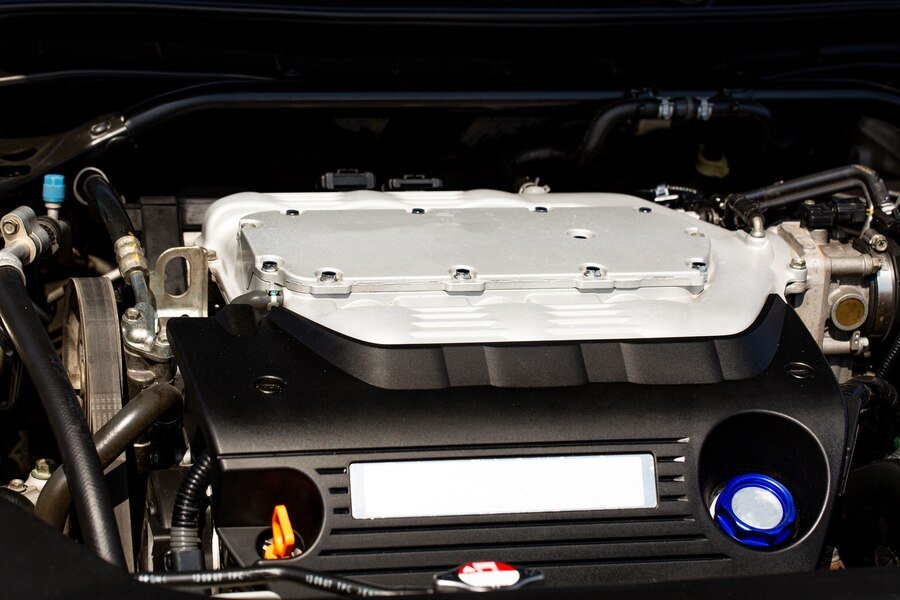The Range Rover Evoque is a luxury compact SUV that has captivated drivers with its distinctive design, advanced technology, and versatile performance. One of the key factors contributing to its versatility is the variety of engine sizes available, each offering different levels of power, efficiency, and driving dynamics. In this comprehensive guide, we’ll explore the various engine of the Range Rover Evoque Engine Size, discuss their features, performance capabilities, and help you determine which engine size is best suited to your needs.
Range Rover Evoque
Since its launch in 2011, the Range Rover Evoque has been a standout in the luxury compact SUV segment. Its sleek, coupe-like design combined with Range Rover’s legendary off-road capability has made it a popular choice among urban drivers and adventure enthusiasts alike. The Evoque is available with several engine options, each offering a unique balance of performance, efficiency, and refinement.
Understanding the engine size is crucial when choosing the right Evoque for your lifestyle. The engine size not only affects the vehicle’s power output and performance but also influences fuel efficiency, driving dynamics, and overall ownership experience.
Overview of Range Rover Evoque Engine Sizes
The Range Rover Evoque offers a range of engine sizes, primarily focusing on 2.0-liter engines. These engines come in different configurations, including petrol, diesel, and mild hybrid variants, allowing drivers to choose an option that best suits their needs. Below, we break down the available engine sizes and their key characteristics:
a. 2.0-Liter Ingenium Petrol Engines
- D200 (Diesel): 2.0L turbocharged, 201 hp, 430 Nm of torque.
- P200 (Petrol): 2.0L turbocharged, 197 hp, 320 Nm of torque.
- P250 (Petrol): 2.0L turbocharged, 246 hp, 365 Nm of torque.
- P300e (PHEV): 1.5L turbocharged, 309 hp combined, 540 Nm of torque.
These 2.0-liter engines form the backbone of the Evoque lineup, offering a blend of power and efficiency. The Ingenium family of engines is designed to deliver responsive performance while maintaining impressive fuel economy and low emissions.
b. 1.5-Liter Ingenium PHEV Engine
- P300e PHEV: 1.5L turbocharged petrol engine combined with an electric motor, delivering a total of 309 hp and 540 Nm of torque.
The 1.5-liter PHEV engine is a new addition to the Evoque lineup, catering to drivers who prioritize efficiency and lower emissions. It offers the flexibility of electric-only driving for short distances, while still providing ample power for longer journeys.
Performance and Driving Experience
Each engine size in the Range Rover Engine offers a unique driving experience, characterized by its power delivery, responsiveness, and efficiency. Here’s a closer look at how these engines perform on the road:
a. 2.0-Liter Petrol Engines (P200, P250)
The 2.0-liter petrol engines in the Evoque are designed for drivers who value smooth and responsive performance. The P200 delivers 197 horsepower, making it an excellent choice for urban driving and daily commutes. It offers brisk acceleration and a refined driving experience, with enough power to handle highway speeds and occasional off-road adventures.
The P250, with its 246 horsepower, is the more powerful of the two petrol options. It provides a sportier driving experience with quicker acceleration and enhanced performance at higher speeds. The P250 is ideal for those who want a bit more excitement behind the wheel without compromising on fuel efficiency.
b. 2.0-Liter Diesel Engines (D165, D200)
The diesel engines in the Evoque are all about torque and efficiency. The D165 and D200 both offer excellent fuel economy, making them ideal for long-distance driving and those who spend a lot of time on the road. The D200, with its 201 horsepower and 430 Nm of torque, is particularly well-suited for drivers who need the extra pulling power for towing or off-road driving.
Diesel engines are also known for their longevity and durability, making them a popular choice for drivers who plan to keep their vehicles for many years. The Evoque’s diesel engines are refined and quiet, offering a smooth driving experience with minimal noise and vibration.
c. 1.5-Liter Plug-In Hybrid (P300e)
The P300e plug-in hybrid engine is a significant step forward for the Evoque in terms of efficiency and environmental responsibility. This engine combines a 1.5-liter petrol engine with an electric motor, delivering a total of 309 horsepower. The P300e can run on electric power alone for short distances (up to 34 miles), making it ideal for city driving and reducing your carbon footprint.
When the petrol engine and electric motor work together, the P300e offers strong acceleration and impressive performance, similar to the P250 petrol engine. It’s a great option for drivers who want the benefits of electrification without sacrificing the driving dynamics they expect from a Range Rover.
Fuel Efficiency and Emissions
Fuel efficiency and emissions are important considerations for any vehicle, and the Range Rover Evoque offers a range of engine sizes to cater to different needs. Let’s take a closer look at the fuel efficiency and emissions of each engine size:
a. 2.0-Liter Petrol Engines (P200, P250)
The 2.0-liter petrol engines offer a good balance between performance and fuel efficiency. The P200 achieves an average fuel consumption of around 31-34 mpg, while the P250 is slightly less efficient, with figures ranging from 28-31 mpg. These engines are best suited for drivers who prioritize performance but still want reasonable fuel economy.
b. 2.0-Liter Diesel Engines (D165, D200)
Diesel engines are known for their superior fuel efficiency, and the Evoque’s diesel options are no exception. The D165 can achieve up to 44-49 mpg, while the D200 offers slightly lower figures at 42-46 mpg. These engines are ideal for long-distance drivers or those who regularly tackle highway miles, as they provide excellent fuel economy and lower CO2 emissions.
c. 1.5-Liter Plug-In Hybrid (P300e)
The P300e plug-in hybrid is the most efficient option in the Evoque lineup, offering an official combined fuel economy of over 141 mpg when used correctly. However, real-world figures may vary depending on driving habits and the frequency of charging. The P300e also benefits from significantly lower CO2 emissions, making it an eco-friendly choice for environmentally conscious drivers.
Technology and Engineering Behind the Engines
The engines in the Range Rover Evoque are part of Land Rover’s Ingenium family, which is known for its cutting-edge technology and advanced engineering. Here are some key features that contribute to the performance and efficiency of these engines:
a. Turbocharging Technology
All engines in the Evoque lineup are turbocharged, which enhances power output and efficiency. Turbocharging allows the engine to deliver more power without increasing its size, resulting in better fuel economy and lower emissions. The turbochargers are designed to provide instant response, reducing lag and improving overall performance.
b. Mild Hybrid Technology
Several engines in the Evoque lineup feature mild hybrid technology (MHEV). This system uses a small electric motor to assist the engine during acceleration and helps recover energy during braking. The mild hybrid system improves fuel efficiency and reduces emissions, particularly in stop-and-go city driving.
c. Advanced Transmission
The engines are paired with a smooth and responsive 9-speed automatic transmission. Which ensures that power is delivered efficiently to the wheels. The transmission is designed to adapt to different driving conditions, providing seamless shifts and optimal performance whether you’re driving in the city, on the highway, or off-road.
d. Lightweight Construction
The Ingenium engines are built using lightweight materials, such as aluminum, which reduces the overall weight of the vehicle. This lightweight construction improves handling, acceleration, and fuel efficiency, while also contributing to the Evoque’s agile and responsive driving dynamics.
Choosing the Right Engine Size for Your Needs
Selecting the right engine size for your Range Rover Evoque depends on your driving habits, performance expectations, and environmental considerations. Here’s a quick guide to help you decide:
a. For City Driving and Daily Commutes
If you primarily drive in the city and want a balance between performance and efficiency.The 2.0-liter petrol engines (P200 or P250) are excellent choices. They offer responsive acceleration, smooth driving, and reasonable fuel economy.
b. For Long-Distance and Highway Driving
If you frequently drive long distances or spend a lot of time on the highway. The 2.0-liter diesel engines (D165 or D200) are ideal. They provide excellent fuel efficiency, strong torque for overtaking, and lower running costs over time.
c. For Eco-Conscious Drivers
The 1.5-liter P300e plug-in hybrid is perfect for eco-conscious drivers who want to reduce their carbon footprint. It offers the flexibility of electric-only driving for short trips, combined with the power and range of a petrol engine for longer journeys.
d. For Performance Enthusiasts
If you’re looking for a more exhilarating driving experience. The P250 petrol engine or the P300e plug-in hybrid are your best bets. Both options offer strong acceleration and dynamic performance, making every drive more engaging and enjoyable.
The Range Rover Evoque offers a diverse range of engine sizes. Each designed to cater to different driving needs and preferences. Whether you prioritize fuel efficiency, performance, or environmental responsibility, there’s an Evoque engine that’s perfect for you.
Understanding the differences between the engine sizes will help you make an informed decision and ensure that your Evoque provides the driving experience you desire.
From the responsive 2.0-liter petrol engines to the efficient 1.5-liter plug-in hybrid, the Evoque’s engine lineup exemplifies Land Rover’s commitment to innovation, performance, and sustainability.
No matter which engine size you choose, you can expect the same level of luxury, capability, and refinement that has made the Range Rover Evoque a standout in the luxury compact SUV market.




